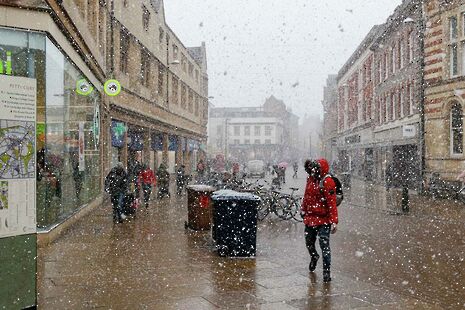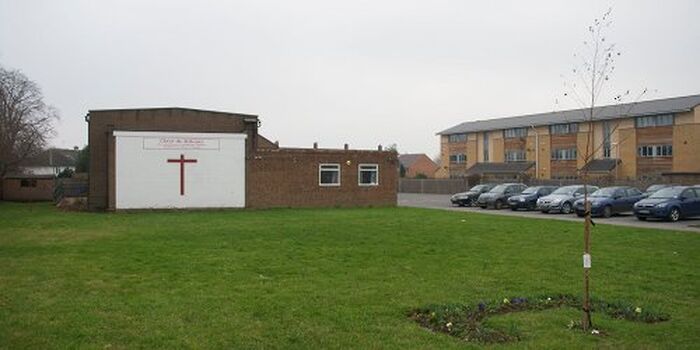Preparing for the colder months: What is the City Council doing for rough sleepers this winter?
As the days grow shorter and the nights get colder, Cambridge City Council releases its strategy to support rough sleepers this winter in collaboration with local charities

This winter, 46 beds will be on offer to rough sleepers in Cambridge as part of the City Council’s Severe Weather Emergency Provision (SWEP).
Under the scheme, which is funded by the Council and managed by Jimmy’s Cambridge and Cambridge Churches Homeless Project (CCHP), rough sleepers are offered emergency accommodation in severe weather conditions between 1st November 2019 and 31st March 2020.
Currently, there are no legal protections for individuals sleeping rough in England during severe weather conditions. Nevertheless, English homelessness charity Homeless Link advises local authorities of their “humanitarian obligation to prevent death on the streets in harsh weather.”
29 beds managed by homelessness charity Jimmy’s Cambridge are currently available to rough sleepers under the SWEP provision, where meals and additional support are also provided to service users. These will only be made available in severe weather conditions, while an additional 17 beds managed by CCHP will be permanently available in church and synagogue halls from 3rd December to the end of March.
There is no set charge for accessing the SWEP provisions, but individuals who are eligible to claim housing benefit are expected to do so to as a condition of their stay, and “100% of the claim for that night will be taken as ‘payment’ for the individual’s stay,” said a representative for Cambridge City Council.
“However,” they explained, “SWEP is offered regardless of an individual’s ability (or willingness) to make a housing benefit claim.”
The emergency provisions are triggered when the Met Office forecasts a temperature low of zero degrees celsius or under for three successive days, and in periods of prolonged heavy rain or high winds, or damp or cold weather.
According to the Council, a “common-sense approach” will be taken as winter progresses, because it “appreciat[es] that long-term exposure to even mild winter weather will take a physical toll and so we may open provision at intervals to give a few days’ respite.”
Rough sleepers may be given accommodation in Bed and Breakfasts or hotels if demand is too high, or in the case of exceptional individual circumstances. As SWEP is an emergency measure, the accommodation will be available to those who have no local connection to Cambridge as well as foreign nationals.
Commenting on the challenges faced by rough sleepers during colder weather, a spokesperson for Cambridge Street Aid, a service provider for rough sleepers in the city, stated: “People who are homeless and/or sleeping rough face challenges all year round: staying safe, keeping track of their possessions, managing their physical and mental health, and so on.
“These difficulties are brought into sharper focus in the winter when it is more difficult to stay warm and stay dry.”
Many local groups who spoke to Varsity praised the Council’s SWEP provision.
Homelessness charity Wintercomfort said that the “Council deliver[s] really well compared to other local authorities and are doing their best given funding constraints.”
Student group Cambridge Homlessness Outreach Programme (CHOP) also praised the way SWEP is activated in “‘severe’ and not ‘cold’ weather, as it takes into account the effect of rain and wind, not just temperature.”
They also commented on the efficiency of the programme, saying that, “Cambridge is quite unique in the collaboration that exists between service providers which make the total service provision quite efficient especially in cases like SWEP.”
Asked if the Council have provided enough beds under SWEP, Jimmy’s stated that “the level of beds currently available under the SWEP provision is enough at this present time and is reviewed constantly.”
However, concerns over how rough sleepers might struggle to access the SWEP provisions, or be reluctant to do so, were also raised by local groups.
CHOP argued that SWEP is “slightly ill-suited for women, or more vulnerable individuals which is at least part of the reason why some will refuse to use this service unless absolutely necessary.”
Street Aid also said that while there are enough beds made available through the programme, they are aware that “there are people who struggle to access SWEP for one reason or another,” though they did not specify such reasons.
Responding to these concerns, a Cambridge City Council representative said: “SWEP provides distinct and separate accommodation for female rough sleepers in a safe environment away from the cold. In addition, SWEP provides three beds at the Victoria Project, Victoria Road, for individuals who may struggle with the environment at Jimmy’s or the Salvation Army.
“Whilst there will be people who will struggle to access SWEP for one reason or another, local agencies work hard as partnership to encourage people into accommodation and help overcome any barriers they may have. It’s been encouraging in this current cold spell to see people using SWEP who have previously not accessed the service.”
In their SWEP guidance, the Council noted the issue of SWEP provision for individuals who are ordinarily banned from homelessness service providers and stated that “clients banned from Jimmy’s Cambridge may be assessed by Jimmy’s and attempts then made to find them an alternative.”
Jimmy’s commented that in these instances, “Each case is reviewed on an individual basis.”
CCHP has also been contacted for comment.
 News / Eight Cambridge researchers awarded €17m in ERC research grants27 December 2025
News / Eight Cambridge researchers awarded €17m in ERC research grants27 December 2025 News / Downing investigates ‘mysterious’ underground burial vault 29 December 2025
News / Downing investigates ‘mysterious’ underground burial vault 29 December 2025 Lifestyle / Ask Auntie Alice29 December 2025
Lifestyle / Ask Auntie Alice29 December 2025 Sport / Hard work, heartbreak and hope: international gymnast Maddie Marshall’s journey 29 December 2025
Sport / Hard work, heartbreak and hope: international gymnast Maddie Marshall’s journey 29 December 2025 Interviews / Meet Juan Michel, Cambridge’s multilingual musician29 December 2025
Interviews / Meet Juan Michel, Cambridge’s multilingual musician29 December 2025









